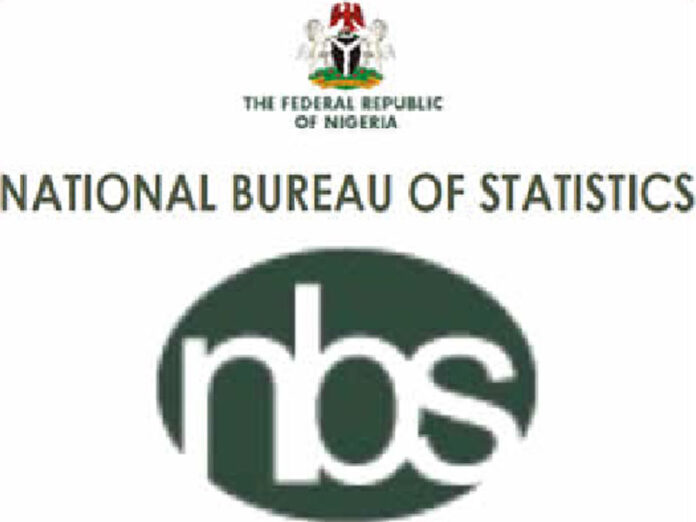The Federal Government (FG) has said that the Nigerian economy is out of recession with 0.11 per cent Gross Domestic Product (GDP) recorded in the last quarter of 2020.
The Minister of State, Budget and Economic Planning, Mr Clem Agba, announced this in Imo on Thursday at the commissioning of a 3.5-kilometer ring road, executed by the Federal Ministry of Agriculture and Rural Development.
Agba said the progress was achieved due to the implementation of the FG’ s economy sustainability plans.
He said under the sustainability plans, the federal government approved N34 billion for the construction of 377 rural roads across the federation.
He said a total of N50 billion was also approved for agricultural loan under the Federal Ministry of Agriculture and Rural Development intervention plans.
The minister said the 3.5-kilometer road was one of the 66 rural roads completed so far by the Federal Ministry of Agriculture and Rural Development under the FG’s sustainability plans.
“The five-man Committee set up by the president recommended rural intervention through construction of rural roads and soft loans for farmers,” he said.
He said the essence of the road was to guarantee access to farmlands without much difficulty.
The minister advised the community to ensure that they utilized the FG”s agricultural loan by channeling the fund into agriculture.
“I advise all Nigerians to go back to farm because food security is the key to sustainable development,” he said.
Agba advised members of All Progressive Congress (APC) in Imo to massively participate in the ongoing party re-registration exercise.
He said President Muhammadu Bihari had demonstrated his love for South-East by approving signature projects in the zone, including the construction of Second Niger Bridge, among others.
The immediate past APC National Organising Secretary, Mr Emma Ibediro, commended the FG for the project, adding that the community will appreciate the president by supporting his programmes.
The Traditional Ruler of the community, Eze Isaac Ibeake, said the ring road would enable farmers transport their farm produce without difficulties.
He appealed to the FG to consider citing agro processing facilities in the community, adding that the community is widely known with agriculture.
The News Agency of Nigeria (NAN) reports that other dignitaries at the commissioning included member representing Okigwe North Federal Constituency Miriam Onuoha, Zonal Director Federal Ministry of Agriculture, and Mr Kenis.
Meanwhile, the National Bureau of Statistics (NBS), says Nigeria’s GDP grew by 0.11 per cent in Quarter Four (Q4) 2020, from the 6.11 per cent contraction in Q3, signaling a gradual recovery from recession.
The NBS said this in the Nigerian Gross Domestic Product (GDP) Report (Q4 and Full Year 2020) released on its website on Thursday in Abuja.
The bureau said this represented the first positive quarterly growth in the last three quarters.
“Though weak, the positive growth reflects the gradual return of economic activities following the easing of restricted movements and limited local and international commercial activities in the preceding quarters.
“As a result, while the Q4 2020 growth rate was lower than growth rate recorded the previous year by –2.44 per cent, it was higher by 3.74 per cent compared to Q3 2020.
“On a quarter-on-quarter basis, real GDP growth was 9.68 per cent indicating a second positive consecutive quarter-on-quarter real growth rate in 2020, after two negative quarters,” the report noted.
The NBS said overall, in 2020, the annual growth of real GDP was estimated at –1.92 per cent, a decline of –4.20 per cent when compared to the 2.27 per cent recorded in 2019.
It said in the quarter under review, aggregate GDP stood at N43.564 billion in nominal terms.
This performance, the bureau said was higher when compared to Q4 2019, which recorded a GDP aggregate of N39.577 billion, representing a year-on-year nominal growth rate of 10.07 per cent.
The NBS classified the Nigerian economy into the oil and non-oil sectors.
For the oil sector, in Q4, an average daily oil production of 1.56 million barrels per day (mbpd) was recorded.
This was lower than the daily average production of 2.00 mbpd recorded in the same quarter of 2019 by -0.44 mbpd and Q3 2020 by –0.11 mbpd.
It added that real growth of the oil sector was –19.76 per cent (year-on-year) in Q4 indicating a decrease by –26.12 per cent relative to the rate recorded in the corresponding quarter of 2019.
“Growth decreased by –5.87 per cent when compared to Q3 2020, while quarter-on-quarter, the oil sector recorded a growth rate of –26.27 per cent in Q4.
“For 2020, the oil sector grew at –8.89 per cent compared to 4.59 per cent in 2019,” the report stated.
It added that the oil sector contributed 5.87 per cent to total real GDP in Q4, down from the corresponding period of 2019 and the preceding quarter, where it contributed 7.32 per cent and 8.73 per cent respectively.
The nation’s non-oil sector grew by 1.69 per cent in real terms in Q4 2020, slower than the 2.26 per cent recorded in the corresponding quarter of 2019, the NBS said.
It, however, said it was better than the –2.51 per cent growth rate recorded in the preceding quarter.
The NBS added that for the full year of 2020, the non-oil sector grew by –1.25 per cent compared to 2.06 per cent in 2019.
It said said growth in the sector was driven by information and communication (Telecommunications and Broadcasting).
Other drivers were agriculture (crop production), real estate, manufacturing (food, beverage and tobacco), mining and quarrying (quarrying and other minerals) and construction, accounting for positive GDP.
“In real terms, the non-oil sector contributed 94.13 per cent to the nation’s GDP in Q4 2020, higher than the share recorded in Q4 2019 (92.68 per cent) and Q3 2020 (91.27 per cent).
“For 2020, the non-oil sector contributed 91.84 per cent to real GDP, higher than 91.22 per cent recorded in 2019,” the NBS report said.
The bureau explained that Quarterly National Accounts (QNA) were an integrated system of macroeconomic accounts designed to describe the entire system of production in a nation on a quarterly basis.
They provide a picture of the current economic status of an economy on a more frequent basis than Annual National Accounts (ANA).
In providing a reasonable level of detailed information of the economy, QNA allows the government to regularly access, analyse and monitor economic developments.





















